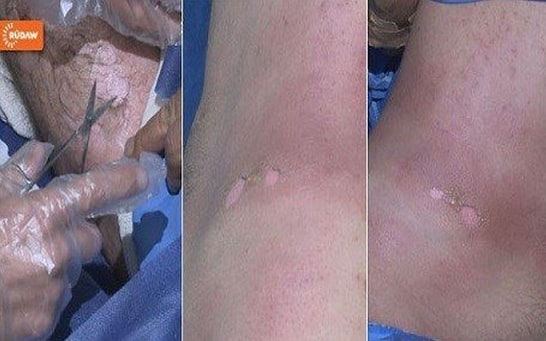Barzani said a mortar barrage late Wednesday carried a gas his fighters had not seen before in ISIS attacks. He said the Peshmerga affected by the chemical agent had breathing problems and skin injuries consistent with mustard gas.
Based on this, Barzani said tests were carried out by experts from one of the countries that belongs to the international coalition to fight the Islamic State, or ISIS. Earlier, Barzani had said a team of US and French experts had collected samples to explain what could have caused the burns and respiratory issues.
The injured soldiers were reportedly transferred to a hospital in Erbil, less than 40km from the frontline.
US officials had earlier announced an investigation into whether ISIS had used chemical weapons against Kurdish forces after a report was broadcast by Rudaw TV and the ENEX media network.
Also, earlier this week, the Ministry of Peshmerga instructed its forces in Makhmour to use gas masks in case of mortar-launched chemical attacks.
Many of the villages neighboring Makhmour, some only 5km away, have been under ISIS control since August last year when the group swept through much of western Iraq.
Kurdish commanders say the jihadists use the villages to mont attacks on Peshmarga positions.
With the presence of mustard gas now established, Kurdish and foreign experts are left to wonder how ISIS gained possession of it.
US-based CNN quoted experts as speculating the gas came from old chemical weapons caches in Iraq or Syria that the US was unaware of.
Mustard gas, or sulfur mustard, has been classified as a chemical warfare agent by the Centers for Disease Control and Prevention. The gas was invented and gained infamy in World War I and was prohibited by international treaty in 1993.
Mustard gas is not usually fatal, but can cause blisters on the skin, eye injuries, blindness and severe respiratory problems.
The agent was developed during World War I and was banned by treaty in 1993. While it is usually not fatal, according to the CDC, it can cause blistering of the skin, eye pain and blindness, as well as respiratory problems.
Germany confirms Peshmerga fighting ISIS were attacked by chemical weapons
The autonomous Kurdistan Regional Government (KRG) in northern Iraq had asked for international help to determine whether chemical weapons had been used in an attack late Tuesday on the Peshmerga on the Makhmur front, some 35 kilometers (22 miles) southwest of Erbil.
There was a “possible chemical weapons attack on the Kurdish frontlines at sector six,” the German defense ministry said.
Muhammad Khoshawi, a Peshmerga commander, told Rudaw on Wednesday that a group of Western experts had arrived in the area to take samples and establish facts after a Tuesday night mortar attack on Kurdish positions in Makhmur, some 35 kilometers (22 miles) southwest of Erbil.
“Last night at least 45 mortar rounds were fired at our positions, which we believe were loaded with chemicals, since the wounds are different,” Khoshawi, whose forces patrol the area, had said.
Burn wounds on the bodies of a number of Peshmerga were examined by the experts and sent to a laboratory for further studies, according to Khoshawi.
He said Peshmerga forces in the area were instructed to use gas masks in case of mortar attacks until results are verified in the laboratory.
This spring, the Kurdish government informed its allies that Peshmerga forces were attacked with chlorine gas. Late last year, ISIS repotedly seized an Iraqi chemical weapons factory with about 2,500 rockets, containing the deadly nerve agent Sarin.
About 80 German soldiers are stationed in the Kurdistan Region to train the Peshmerga forces. Germany is one of the few countries supplying the Kurdish troops directly through Erbil and not through the Iraqi central government in Bagdad.
The German defense ministry said that there will be no changes for the mission in the Kurdistan Region. German soldiers will continue to train Peshmerga forces.
ATTENTION READERS
We See The World From All Sides and Want YOU To Be Fully InformedIn fact, intentional disinformation is a disgraceful scourge in media today. So to assuage any possible errant incorrect information posted herein, we strongly encourage you to seek corroboration from other non-VT sources before forming an educated opinion.
About VT - Policies & Disclosures - Comment Policy




